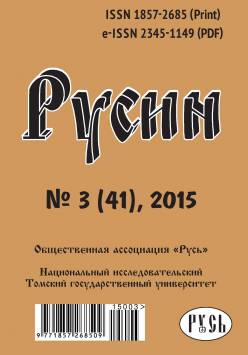The preservation of the Austro-Hungarian Empire by means of federalisation in the interests of the Slavic peoples: myth or missed opportunity?
Austrian (Austro-Hungarian since 1867) Empire was a country with a unique combination of different peoples under the auspices of the Habsburg monarchy. However, the existing model of the national-state structure did not reflect the requests of its ethno-poLiticaL system, mainly that for adequate political representation of the Slavic peoples. The desire of the monarchy to observe the supranational principle as weLL as the conservatism of the Vienna bureaucracy and the general inertia of Austrian political and administrative mechanism made it difficult to reform the state structure of the Empire. The author concludes that certain opportunities for this reform that would take into account the ethnic factor developed after the "Spring of Nations" in 1848 and Austria's defeat in the war with Prussia in 1866, when Vienna was excluded from the process of German unification and couLd address internal problems. However, the combination of subjective and objective factors together with the position of the main political actors in the process of transforming the structure of the Empire promoted Vienna's compromise with Hungary. This duaListic modeL strengthened and preserved the country for a whiLe, but the rejected demands of SLavic (mostLy Czech) Leaders for a deeper nationaL-territoriaL reform Limited the maneuver for the ImperiaL authorities and exacerbated the crisis that eventually led to the collapse of the Austrian Empire in 1918.
Keywords
Австрийская империя,
Австро-Венгрия,
славянство,
империя,
этнополитическая система,
национально-государственное устройство,
федерализация,
модернизация,
Austrian Empire,
Austria-Hungary,
Slavs,
Empire,
ethnopoLiticaL system,
national-state structure,
federaLisation,
modernisationAuthors
| Biryukov Sergey V. | East China Normal University | birs.07@mail.ru |
Всего: 1
References
Бауэр О. Национальный вопрос и социал-демократия // Нации и национализм. М.: Праксис, 2002. С. 52-120
Гатагова Л.С. Империя: идентификация проблемы // Исторические исследования в России. Тенденции последних лет. М., 1996. С. 332-353
Дьяченко В. Украина «доброго цкаря». Как жили западноукраинские земли под властью императора Франца Иосифа. URL: http:// yagazeta.com/nepoznannoe/ tajny/kak_zhili_zapadnoukrainskie_zemli_pod_ vlastyu_imperatora_franca-iosifa.html (дата обращения: 18.11.2018)
Ефремов А. Уроки погибшей империи // Вопросы национализма. 2011. № 8. С. 233-237
Ким Дж., Мьюллер Ч.У., Клекка У.Р. Факторный, дискриминантный и кластерный анализ. М., 1989. 215 с
Каспэ С.И. Империя и модернизация: Общая модель и российская специфика. М., 2001. 256 с
Кундера М. Семьдесят три слова // Урал. 2001. № 5. C. 161-177
Мюнклер Г. Империи. Логика господства над миром: от Древнего Рима до США. М., 2015. 400 с
Шарый А., Шимов Я. Корни и корона. Очерки об Австро-Венгрии: судьба империи. М., 2010. 478 с
Шпрингер Р. Национальная проблема. М., 1902. 328 с
Энгельс Ф. Борьба в Венгрии // Маркс К., Энгельс Ф. Собр. соч. : в 39 т. М.: Изд-во полит. лит., 1955-1974. Т. VI. С. 181-182, 550-569
Яси О. Распад Габсбургской монархии. М., 2011. 608 с
Bauer O. Die Nationalitatenfrage und die Sozialdemokratie. Wien, 1908. 600 s
Boas G. La tradition // Diogene. 1960. № 31. P. 76
Darmstaedter F. Bismarck and the Creation of the Second Reich. New Jersey, 2008. 426 p
Elazar D. Exploring Federalism. Tuscaloosa, 1987. 335 p
Eyck E. Bismarck and the German Empire. New York City, 1964. 332 p
Hein D. Deutsche Geschichte im 19. Jahrhundert. München, 2016. 128 c.
Hobsbaum E. The Age of Empire: 1875-1914. London, 1987. 448 p.
Hobsbaum E. Nationen und Nationalismus: Mythos und Realität seit 1780. München, 1996. 256 s.
Horowitz D.L. A Democratic South Africa? Constitutional Engineering in a Divided Society. Oakland, 1991. 304 p.
Király B. K. Ferenc Deák. Twayne’s world leaders series. Boston, 1975. 243 p.
Lehmann H. (Hrsg.). Das Nationalitaetenproblem in Oesterreich. 1848-1918. Goettingen, 1973. 126 s.
Naumann F. Mitteleuropa. Berlin, 1915. 299 s.
Taylor A.J.P. The Habsburg Monarchy, 1809-1918: a History of the Austrian Empire and Austria-Hungary. Oxford, 2013 (reprinted). 304 p.
Wandruszka А. Großdeutsche und kleindeutsche Ideologie 1840-1871 // Robert Kann; Friedrich Prinz (Hrsg.): Deutschland und Österreich. Ein bilaterales Geschichtsbuch. Wien, 1980. S. 110-142.
_12_2018_1546863091.jpg)
